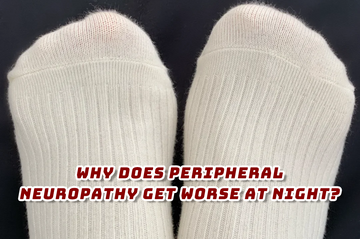Why Does Peripheral Neuropathy Get Worse at Night?
Peripheral neuropathy, a condition caused by damage to the peripheral nerves, often worsens at night. This heightened discomfort can make falling or staying asleep challenging, leading to disrupted rest and diminished quality of life. Understanding why neuropathy symptoms intensify at night can help you manage the condition more effectively. Here’s a detailed explanation and some tips for relief.
1. Reduced Distractions
- During the day, the brain is busy processing various stimuli, such as work, conversations, or movement. These distractions help dampen the perception of pain or discomfort.
- At night, when you're lying in bed with fewer distractions, you’re more aware of the sensations in your body, making pain or tingling from neuropathy feel worse.
2. Body Position
- When lying down, the change in blood circulation can affect nerve function.
- Gravity may lead to increased pressure on already damaged nerves, particularly in the hands or feet, intensifying the sensations of burning, tingling, or pain.
3. Temperature Sensitivity
- Peripheral neuropathy often causes heightened sensitivity to temperature.
- Many people find that cooler nighttime temperatures exacerbate nerve pain. Conversely, warmth might help reduce symptoms for some individuals.
4. Lack of Movement
- Physical activity during the day promotes blood flow and helps reduce stiffness and pain in affected areas.
- At night, the lack of movement may lead to a buildup of inflammatory chemicals or fluids in the extremities, aggravating neuropathy symptoms.
5. Changes in Nerve Function
- At night, the nervous system undergoes natural changes to promote rest. For people with neuropathy, these changes might heighten the perception of pain or alter how the damaged nerves transmit signals to the brain.
- Damaged nerves can become hyperactive, sending pain signals even in the absence of stimuli, which is more noticeable in the stillness of nighttime.
How to Manage Peripheral Neuropathy at Night
If neuropathy symptoms worsen at night, these strategies may help provide relief:
1. Adjust Your Sleeping Position
- Elevate your legs slightly using a pillow to improve blood circulation.
- Consider side-sleeping to reduce pressure on affected areas.
2. Maintain a Comfortable Temperature
- Use warm socks or a heating pad to help soothe cold-sensitive nerves. Conversely, cooling pads might be helpful if heat exacerbates your symptoms.
- Experiment with materials like bamboo socks, which regulate temperature and keep feet comfortable.
3. Stay Active During the Day
- Engage in regular, low-impact exercises such as walking or yoga to promote circulation and reduce nerve pain.
4. Use Pain Relief Techniques
- Over-the-counter medications like acetaminophen or ibuprofen can help manage pain. Consult your doctor about prescription medications or topical creams containing capsaicin or lidocaine.
- Gentle foot massages or the use of a neuropathy-focused foot massager can alleviate discomfort.
5. Consider Supplements
- Some people find relief with supplements like alpha-lipoic acid, vitamin B12, or magnesium. Always consult your healthcare provider before starting any new supplements.
6. Establish a Nighttime Routine
- Create a calming bedtime routine with activities like reading, meditation, or deep-breathing exercises to help you relax.
- Avoid caffeine, alcohol, and heavy meals close to bedtime, as they can exacerbate symptoms.
7. Manage Blood Sugar Levels
- For people with diabetes, maintaining stable blood sugar levels is crucial. Fluctuating glucose levels can worsen nerve damage and increase nighttime discomfort.
When to Seek Medical Advice
If nighttime neuropathy symptoms are severely disrupting your sleep or quality of life, consult your doctor. They may suggest:
- Prescription medications like gabapentin, pregabalin, or antidepressants specifically designed to address nerve pain.
- Physical therapy or alternative treatments like acupuncture to manage symptoms.
Conclusion
Peripheral neuropathy worsens at night due to factors like reduced distractions, changes in blood flow, cooler temperatures, and the natural state of rest. By understanding these triggers and adopting lifestyle changes—such as using supportive aids like bamboo socks for comfort—you can manage symptoms and improve sleep quality. Always consult with a healthcare professional for a personalized approach to treatment.
